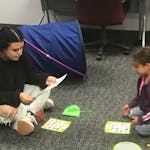FARIBAULT, Minn. – In the classroom turned courtroom, the teenage litigators sat nervously awaiting the start of the trial. After a short pep talk from judge Kelly Rodgers, the students nodded in affirmation: they were ready for opening statements.
With that, one of the six American history students at the Minnesota State High School for the Deaf and Hard of Hearing stepped up to the podium and began to silently argue the case. It dealt with bullying and centered on a possible hate crime committed in the halls of a fabricated school.
Throughout the hourlong mock trial, the students had to frequently pause from signing, waiting for interpreters to repeat their points or questions for the handful of non-student observers.
At the back of the room, a few members of Hamline University's mock trial team watched and listened, awaiting their turn to be called as witnesses.
"It was amazing and impressive to see how passionate the students were arguing," said Maddie Thieschafer, an 18-year-old Hamline student.
Thieschafer is used to having several months to prepare a mock trial case with her team. The high school students she was watching had just two weeks.
But even a brief introduction to what happens in a courtroom can be beneficial for deaf students, said Elizabeth Knox, who is deaf and practices law in Dallas. She graduated from Harvard Law School in 2016.
"It offers an opportunity to teach the self-advocacy skills in the moment," Knox said.
In her own career, Knox has met just a few other deaf lawyers, although she's connected with many more through the Deaf and Hard of Hearing Bar Association. In both classrooms and courtrooms, she's used various accommodations, including captioning and assistive listening devices.
"There's a kind of self-selection where deaf people think they shouldn't or couldn't [pursue a career in law]," Knox said. "I'm really happy to know that high school kids get a chance to see that they absolutely can."
Rodgers hopes the students will stay involved.
"My goal is to see them at a tournament someday," she said. "I would love to see them break the mold of what type of student and what type of high school usually competes in mock trial."
Beginning in late November, Rodgers, director of Hamline's mock trial team, along with a few university students, took the trip to Faribault over about 10 class periods to help coach the students in Megan Frowick Morgan's class.
With the help of interpreters, the first lessons focused on the basics of a trial's structure. Later, team members helped students brainstorm pointed questions for cross-examination and phrasing for closing arguments. The goal: to help build confidence and encourage the teens to think analytically and strategically.
"We talked a lot about how to be your best persuasive self, which I guess isn't too hard for high school students," Rodgers said. "But their progress from day one to the end was amazing."
Student litigator Aubrey Gillespie, 17, admitted she was nervous, but was determined not to let it show. Rodgers had pushed Gillespie to give the closing arguments, telling the teen that her zeal and pluck would make an impression on jurors.
After striding to the podium, Gillespie started to sign rapidly, forcefully. Her expression was resolute and her conviction obvious as she argued against the defendant, telling the jury that her team had more than met the burden of proof despite the lack of witnesses to the crime.
Being emphatic and expressive is a part of deaf culture, Gillespie said.
"But I really wanted to prove he was guilty," she added.
As a jury of the students' peers deliberated in the hall after final arguments, the young litigators reflected on the trial. A few wished there were more time for rebuttals. One student said the experience would help if she were ever in a courtroom herself, whether as a lawyer, juror, witness or defendant. Others said the trial was fun but a little stressful.
In the end, Gillespie did convince the jury — mostly.
The jury found the defendant guilty of damaging property by spray painting a locker, though jurors ruled it was not a crime motivated by hate.
The conviction was followed by a round of silent applause. Jacobs assured both sides that the verdict was a win-win.
Anne Grace Donatucci, director of the Minnesota State Academy for the Deaf, (MSAD) said the partnership both empowered and energized the high school students. The discussions forced them to think outside the box and set aside their own worldview and bias, she said.
"My hope is that they walk away from this experience with tools to help them address problems or conflicts with a critical mind and ability to take on multiple perspectives," Grace Donatucci said.
Rodgers encouraged the students to attend a mock trial camp at Hamline to hone their advocacy skills and experience life on a college campus.
As Rodgers and Frowick Morgan each expressed their pride in the students, a few teens continued to sign to each other from across the room, not quite ready to put the case to rest.
Said Frowick Morgan: "They aren't done yet."
Mara Klecker • 612-673-4440





